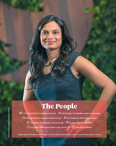Introducing Christopher Sprigman
Professor of Law
Printer Friendly VersionOne afternoon last October when Christopher Sprigman heard that the provocative British graffiti artist Banksy was staging a street performance in nearby Union Square, he rushed out to join the crowds and snapped photos of a giant fiberglass Ronald McDonald having his oversize clown shoes shined by a street urchin.
For some, the moment was mere entertainment. For Sprigman, 48, the performance was “a brilliant piece of trademark appropriation art—great material for my teaching and inspiration for research.”
Moving from the University of Virginia School of Law to join NYU Law has invigorated Sprigman, an intellectual property law scholar with a focus on the intersection of IP and culture.
Writing for the popular Freakonomics blog, Sprigman has weighed in on Banksy as well as Cronuts, Trader Joe’s, and multiplex cinemas. He published a series of op-eds in the New York Times and elsewhere on the NSA controversy and has written for other influential media outlets. “He’s always got his antennas up,” says colleague Jeanne Fromer. “He sniffs out an issue that people care about and connects it to something deeper that he is thinking about.”
Sprigman has carved out a niche in the area of “IP without IP,” or industries that survive in the absence of strong IP protection. “There’s lots of conversation about ‘IP without IP,’” says Professor Mark McKenna of Notre Dame Law School. “Chris is one of the first and most prominent voices in that mode of scholarship.” Conventional wisdom holds that copying kills creativity and that laws protecting against imitation are essential to innovation and economic success. Sprigman, along with his co-author and childhood friend Kal Raustiala, have challenged that notion in their book The Knockoff Economy: How Imitation Sparks Innovation. Drawing on fashion, food, finance, comedy, and even football, which enjoy fewer IP rights than industries like music, movies, and pharmaceuticals, they show that innovation can thrive in a world of less, and less effective, IP protections.
[See “Creative License ” for more on Sprigman’s scholarship.]
Sprigman’s ideas and arguments are often bold and self-assured, traits that were apparent early in life. He was raised in Smithtown, on Long Island’s North Shore, by his parents Fred and Marilyn, both schoolteachers, with a large extended family. He spent his days by the water Huckleberry Finn style, “fishing, clamming, eating my lunch on the beach, and watching birds,” he recalls. “I was self-directed and interested in a lot of things, master of my own time.”
This willingness to dive into diverse interests is reflected in Sprigman’s winding path to academia. After earning his bachelor’s degree from the University of Pennsylvania in history, magna cum laude, he worked at a publishing company, played guitar in various bands, traveled through East Asia, and toyed with the idea of pursuing journalism before entering the University of Chicago Law School.
He earned his JD with honors, then clerked for Judge Stephen Reinhardt of the US Court of Appeals for the Ninth Circuit, worked as an associate at Davis Polk & Wardwell, and clerked for Justice Lourens Ackermann of the Constitutional Court of South Africa in Johannesburg while teaching at the University of the Witwatersrand School of Law. Returning to the US in 1999, he worked as an appellate counsel in the Department of Justice’s Antitrust Division during the time that US v. Microsoft Corp. was going to trial. “It was absolutely fascinating,” he says. “We were deeply immersed in the facts that made law.”
Sprigman returned to law practice, making partner at King & Spalding at age 35. But not yet ready to settle down career-wise, he landed a fellowship in 2003 at Stanford Law School’s Center for Internet and Society. Sprigman set a goal of writing an article within four months that he could take on the job market, if his mentor and the center’s founder Lawrence Lessig deemed it satisfactory. The result was a paper that reintroduced the idea of formalities in copyright law. Its boldness won Lessig’s approval.
“The conventional wisdom in the world of IP scholars at the time was that this was a crazy, radical idea. It was a brave thing to do,” says Lessig, now at Harvard Law School, adding that Sprigman’s current work in “IP without IP” demonstrates the same ahead-of-the-curve “edginess.”
Since moving from Charlottesville, where he earned a reputation for caring equally about teaching, scholarship, and colleagues, Sprigman has been enjoying living once again near his extended family and parents, who are still in the house where he grew up. When not working, he cooks gourmet meals for friends; spends time with his children Iain, 14, and Arin, 12; and cycles. “Down in Virginia, I used to get a lot of thinking done on the bike. That’s more challenging in New York,” he says. “Maybe it’s time to start running again.”
—

